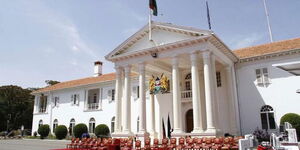Kenya's leading TV station, Citizen TV, will pay for a Twitter blue badge, Kenyans.co.ke can authoritatively report.
A highly-placed source at the Kilimani-based media outlet confirmed on Friday, April 21, that Citizen TV's parent company, Royal Media Services (RMS), will also pay for a Twitter verification for its slate of TV and radio stations.
"Yes, we are going to pay for all our accounts," the source told Kenyans.co.ke.
Among the outlets to benefit from the directive include Inooro TV and Ramogi TV as well as Radio Citizen, Mulembe FM, Ramogi FM and 11 others.
The development came after several fake accounts upstaged its main account, which has over 5.2 million followers, when Twitter stripped off its blue badge on Thursday, April 20.
Twitter accounts with unchecked marks, nicknamed Citizen TV-A, Citizen TV-B, Citizen TV-C, and Citizen TV-D, bow the colours of the media outlet and used the platform to spread unreliable news.
The parody accounts made numerous claims, including appointments of senior government officials and ongoing court cases.
Notably, all the claims by the impersonating accounts were fake and lacked newsworthiness.
The outlet hit back by advising its followers to, "Stay updated and debunk fake news by following our official Citizen TV Twitter account."
Several other Kenyan media organisations also lost their blue badges including K24, KBC and KTN News. The outlets initially carried the blue badges because their handles were considered legacy accounts.
The Twitter Blue Badge, also known as the verification badge, is a symbol that appears next to a Twitter user's name to indicate that Twitter has verified the account as authentic and belonging to the person or organisation it claims to represent.
The Blue Badge aims to help users identify genuine accounts, particularly those of public figures, celebrities, and organizations, from fake or impersonating accounts.
A verified badge can also help increase a user's credibility and give them more authority on the platform.
Not everyone can get a blue badge on Twitter. Twitter has a strict verification process and users must meet certain criteria to be considered for verification.
Generally, Twitter requires users to have a complete profile with a profile picture, a header image, and a bio, as well as an active presence on the platform. Users may also need to provide additional documentation, such as a government-issued ID, to prove their identity.
With the new directive, Twitter charges approximately Ksh1,073 ($8) every monthly for individual accounts seeking verification while organisations are expected to part with Ksh134,131 ($1,000).
In Kenya, impersonation is a criminal offence covered under the Penal Code.
Section 382 of the Penal Code states that any person who falsely represents themselves as another person with the intention to deceive or cause harm is guilty of an offence.
The offense is punishable by imprisonment for a term not exceeding three years or a fine, or both. Additionally, any property obtained through the impersonation can be forfeited, and any documents or instruments used in the impersonation can be confiscated.
Impersonation can take many forms, including impersonating a public official, a business or organisation, or another person for financial gain. Using a false name or identity to obtain a benefit, such as a job or a loan, is also an offence.
The law on impersonation is designed to protect individuals and organisations from harm and to ensure that justice is served in cases where impersonation has occurred.












